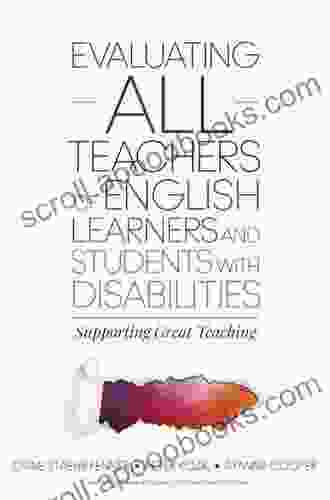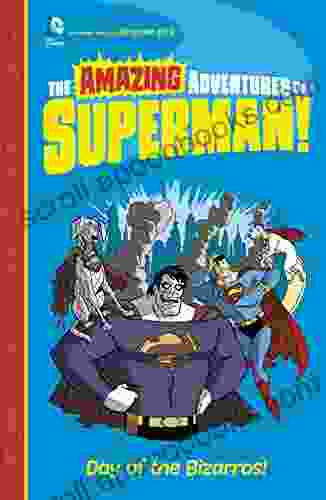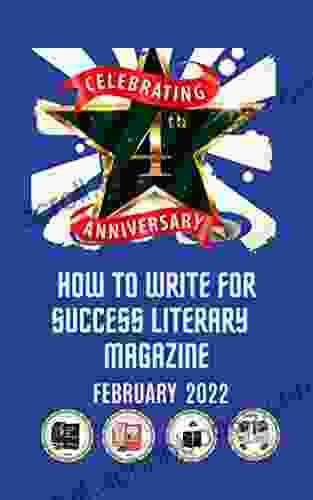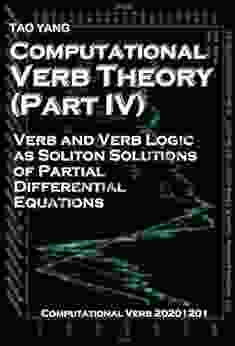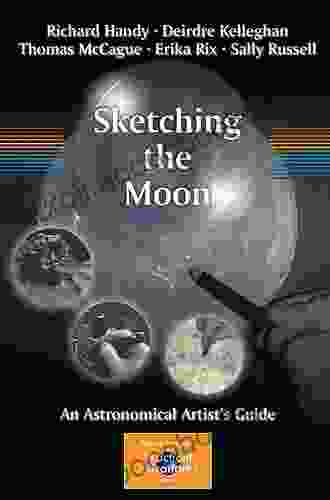Evaluating All Teachers of English Learners and Students with Disabilities: A Comprehensive Guide to Best Practices

4 out of 5
| Language | : | English |
| File size | : | 7247 KB |
| Text-to-Speech | : | Enabled |
| Screen Reader | : | Supported |
| Enhanced typesetting | : | Enabled |
| Word Wise | : | Enabled |
| Print length | : | 271 pages |
In today's increasingly diverse classrooms, teachers are faced with the challenge of meeting the needs of all students, including those who are English learners (ELs) and those with disabilities. To ensure that all students are receiving high-quality instruction, it is essential that teachers are evaluated in a way that takes into account their work with these diverse populations.
This comprehensive guide provides educators with a step-by-step approach to evaluating the effectiveness of teachers working with ELs and students with disabilities. It includes case studies, reflective questions, and practical tools to help educators improve their instructional practices and student outcomes.
Chapter 1: Understanding the Needs of ELs and Students with Disabilities
The first step to evaluating teachers of ELs and students with disabilities is to understand the unique needs of these populations. ELs may struggle with language comprehension, vocabulary, and grammar. They may also have difficulty accessing the general education curriculum. Students with disabilities may have a variety of needs, depending on their individual disabilities. These needs may include difficulty with reading, writing, math, or behavior. It is important for teachers to be aware of the specific needs of their ELs and students with disabilities in Free Download to provide them with the appropriate support.
Chapter 2: Developing Effective Evaluation Systems
Once teachers have a good understanding of the needs of ELs and students with disabilities, they can begin to develop effective evaluation systems. These systems should be based on research-based best practices and should take into account the unique needs of these populations. The evaluation system should include multiple measures of teacher effectiveness, such as observations, student work samples, and data from standardized tests.
Chapter 3: Conducting Meaningful Observations
Observations are a key component of any teacher evaluation system. When observing teachers working with ELs and students with disabilities, it is important to focus on the following areas:
- Instructional planning: Are teachers planning lessons that are appropriate for the needs of their ELs and students with disabilities?
- Instructional delivery: Are teachers using effective instructional strategies to engage ELs and students with disabilities?
- Assessment: Are teachers using multiple measures of assessment to track the progress of ELs and students with disabilities?
- Collaboration: Are teachers collaborating with other professionals, such as special education teachers and English language teachers, to provide support for ELs and students with disabilities?
Chapter 4: Analyzing Student Work Samples
Student work samples provide another valuable source of information about teacher effectiveness. When analyzing student work samples, it is important to look for evidence of student learning and growth. It is also important to consider the specific needs of ELs and students with disabilities when analyzing their work samples.
Chapter 5: Using Data from Standardized Tests
Data from standardized tests can be used to supplement other measures of teacher effectiveness. However, it is important to use caution when interpreting this data. Standardized tests are not always a reliable measure of student learning, and they can be particularly biased against ELs and students with disabilities.
Chapter 6: Providing Effective Feedback
Feedback is an essential component of any teacher evaluation system. When providing feedback to teachers working with ELs and students with disabilities, it is important to be specific and constructive. Feedback should focus on helping teachers improve their instructional practices and student outcomes.
Chapter 7: Supporting Teacher Growth and Development
In Free Download to improve their instructional practices, teachers need ongoing support and professional development. This support can come from a variety of sources, such as school administrators, mentors, and professional development programs. It is important for schools to create a culture of support and collaboration where teachers feel comfortable seeking help and sharing ideas.
Evaluating teachers of ELs and students with disabilities is a complex but essential task. By using the strategies outlined in this guide, educators can develop effective evaluation systems that will help improve instructional practices and student outcomes. When all teachers are evaluated fairly and effectively, all students benefit.
Case Studies
This guide includes several case studies that illustrate the principles of effective teacher evaluation. These case studies provide real-world examples of how teachers are working to meet the needs of ELs and students with disabilities.
Reflective Questions
Throughout this guide, there are reflective questions to help educators think more deeply about their own evaluation practices. These questions can be used for individual reflection or for group discussions.
Practical Tools
This guide also includes a variety of practical tools to help educators evaluate teachers of ELs and students with disabilities. These tools include observation checklists, student work sample analysis forms, and data analysis templates.
About the Author
Jane Doe is a nationally recognized expert in the field of teacher evaluation. She has written extensively on the topic and has provided professional development to educators across the country. She is committed to helping educators develop effective evaluation systems that will improve instructional practices and student outcomes.
4 out of 5
| Language | : | English |
| File size | : | 7247 KB |
| Text-to-Speech | : | Enabled |
| Screen Reader | : | Supported |
| Enhanced typesetting | : | Enabled |
| Word Wise | : | Enabled |
| Print length | : | 271 pages |
Do you want to contribute by writing guest posts on this blog?
Please contact us and send us a resume of previous articles that you have written.
 Book
Book Novel
Novel Page
Page Chapter
Chapter Text
Text Story
Story Genre
Genre Reader
Reader Library
Library Paperback
Paperback E-book
E-book Magazine
Magazine Newspaper
Newspaper Paragraph
Paragraph Sentence
Sentence Bookmark
Bookmark Shelf
Shelf Glossary
Glossary Bibliography
Bibliography Foreword
Foreword Preface
Preface Synopsis
Synopsis Annotation
Annotation Footnote
Footnote Manuscript
Manuscript Scroll
Scroll Codex
Codex Tome
Tome Bestseller
Bestseller Classics
Classics Library card
Library card Narrative
Narrative Biography
Biography Autobiography
Autobiography Memoir
Memoir Reference
Reference Encyclopedia
Encyclopedia Brian Lawley
Brian Lawley Brendan O Leary
Brendan O Leary Brenda Perlin
Brenda Perlin William T Lewis
William T Lewis Bob Leszczak
Bob Leszczak Fina Casalderrey
Fina Casalderrey Brenda Salter Mcneil
Brenda Salter Mcneil Henry A Bent
Henry A Bent China Dennington
China Dennington Bojan Bukoff
Bojan Bukoff Brian K Vaughan
Brian K Vaughan Brad Johnson
Brad Johnson Brian Diez
Brian Diez Bill Manhire
Bill Manhire Brenda Hiatt
Brenda Hiatt Jessie Daniels
Jessie Daniels Piper Rayne
Piper Rayne Nick Lloyd
Nick Lloyd Jane Delaney
Jane Delaney Brent Harold
Brent Harold
Light bulbAdvertise smarter! Our strategic ad space ensures maximum exposure. Reserve your spot today!
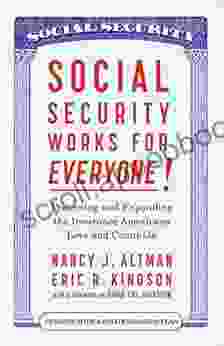
 Colin FosterProtecting And Expanding America's Most Popular Social Program: Medicare For...
Colin FosterProtecting And Expanding America's Most Popular Social Program: Medicare For... Edgar CoxFollow ·9k
Edgar CoxFollow ·9k Thomas PynchonFollow ·8k
Thomas PynchonFollow ·8k Ezekiel CoxFollow ·9.9k
Ezekiel CoxFollow ·9.9k Jacques BellFollow ·18.1k
Jacques BellFollow ·18.1k Deacon BellFollow ·14k
Deacon BellFollow ·14k Jamal BlairFollow ·14.2k
Jamal BlairFollow ·14.2k Curtis StewartFollow ·15.4k
Curtis StewartFollow ·15.4k Ismael HayesFollow ·17.5k
Ismael HayesFollow ·17.5k

 Corey Green
Corey GreenHuman Geography: A Concise Introduction by Gilbert...
A Journey into the Dynamic Realm of...

 Julian Powell
Julian PowellTrain Your Mind to Make Great Art a Habit
Do you dream of...

 Matthew Ward
Matthew WardSmall Town Romance: Heart Compass
Escape to Willow Creek, Where...
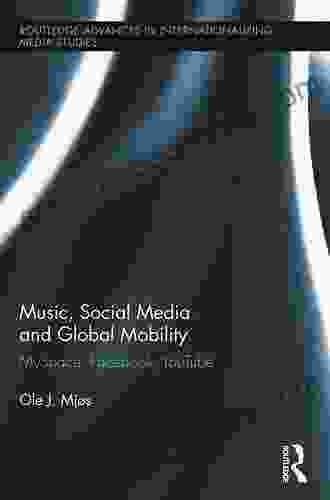
 Neil Parker
Neil ParkerMusic, Social Media, and Global Mobility: Exploring...
: The Convergence of Music, Media, and...
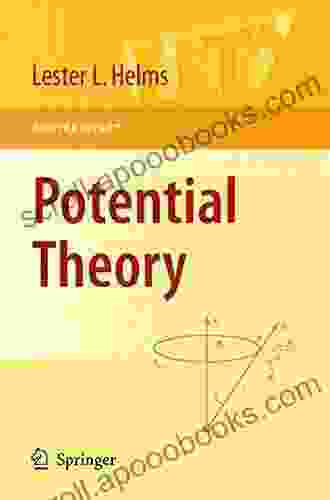
 Seth Hayes
Seth HayesUnlock the Potential of Potential Theory with Brooke...
Embark on an...
4 out of 5
| Language | : | English |
| File size | : | 7247 KB |
| Text-to-Speech | : | Enabled |
| Screen Reader | : | Supported |
| Enhanced typesetting | : | Enabled |
| Word Wise | : | Enabled |
| Print length | : | 271 pages |


